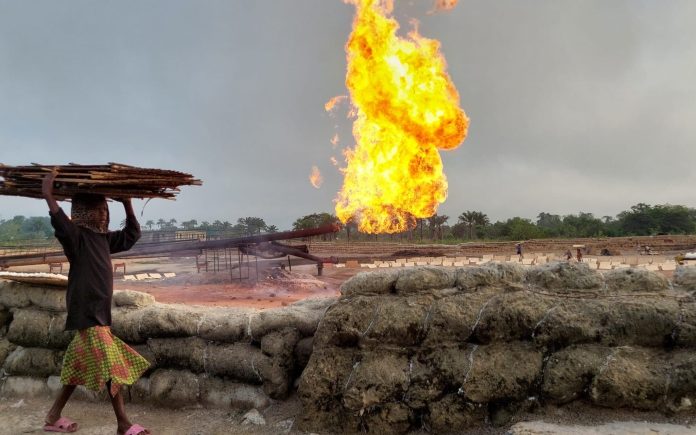EXPERTS urge reforms, including gas price deregulation and the development of floating LNG vessels, to reduce gas flaring and boost economic growth.
Nigeria’s gas flaring issue has reached alarming levels, with recent findings showing that the gas flaring in the first half of 2024 could power more than three million homes. The National Oil Spill Detection and Response Agency (NOSDRA) reported that operators flared 148.7 million standard cubic feet of gas in the first six months of the year.
According to NOSDRA’s Gas Flare Tracker, this wasted gas has a potential power generation of 3,401.83 megawatts (MW). The US Energy Information Administration estimates that one megawatt can supply electricity to 1,000 households. This quantity of gas flared in six months could provide electricity to at least 3.4 million homes.
The economic impact also remains significant. The value of the flared gas stands at $360 million, which could ease Nigeria’s foreign exchange shortage. This shortage has slowed economic growth, weakened the naira, and increased inflation.
Despite being Africa’s largest oil producer, Nigeria struggles with severe energy challenges. The Nigerian Electricity System Operator reports that the country has an installed power generating capacity of about 13,014.14MW but operates only around 4,000MW. As a result, over 85 million Nigerians lack access to electricity, and over 75 per cent of the population lives without clean cooking energy.
Olu Verhejen, Special Adviser to President Bola Tinubu on Energy, highlighted the dire consequences of this energy poverty. “Despite interventions and subsidies, over 100 million Nigerians still do not have access to consistent and affordable electricity,” she said. “This directly impacts citizens’ ability to achieve meaningful income growth, limits productivity, and restricts economic expansion.”
Recent events have underscored the severity of Nigeria’s energy problems. A few weeks ago, the national electricity grid partially collapsed, causing blackouts in most parts of the country for the seventh time this year. Since privatisation a decade ago, the grid has collapsed over 141 times, revealing deep flaws in the sector.
Experts Urge Rapid Gas Flaring Reforms
Preye David Orodu, lead engineer at KEOT Synergy, stressed the need for a robust infrastructure network to support gas commercialisation. He noted significant issues in the domestic liquefied petroleum gas (LPG) supply chain, partly due to imports.
Energy analyst Bala Zakka argues that Nigeria’s natural gas resources could attract investment in gas turbines and boost electricity generation. Another analyst, Kelvin Emmanuel, emphasises the need to deregulate gas prices to encourage operators to commercialise flared gas, reducing environmental and economic losses.
Emmanuel also suggests developing floating liquefied natural gas (FLNG) vessels as a more sustainable solution. “This approach could lower construction costs, reduce vandalism risks, and facilitate the offtake of gas from well-heads,” he said, adding that it would eliminate the need for gas flaring or re-injection.
As Nigeria faces ongoing energy challenges, experts call for swift action to harness its gas resources, reduce flaring, and transform the energy sector into a driver of economic growth.


